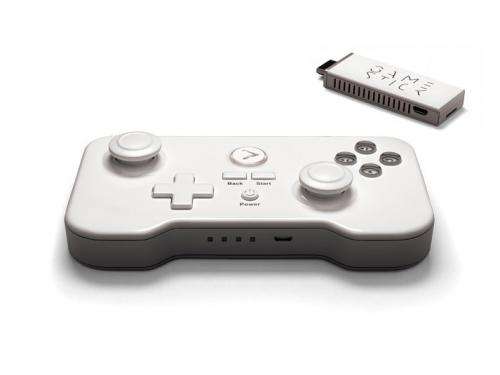Review: New GameStick console is small and cheap, but still needs work

The big news in gaming this year is, of course, the launch of new game consoles from two of the industry's gorillas - Microsoft and Sony. But there's another storyline in gaming that could end up being just as important: the launch of a series of game machines based on Google's Android operating system.
Already this year, we've seen the launch of the Ouya console and Nvidia's Shield handheld device. Now comes another: the GameStick from U.K.-based gaming company PlayJam.
Along with the Ouya gadget, the GameStick is trying to create a new market within the game business. Both gadgets offer a new kind of home gaming device, one that costs much less and potentially appeals to a much wider audience than traditional console games. The premise of both devices is essentially the same: They both build on the burgeoning popularity of mobile gaming by bringing to the living room games that have proved popular on smartphones and tablets.
I liked the promise of Ouya's device when I reviewed it earlier this year. But I found its selection of games to be poor and thought its hardware and software needed refining.
I have similar feelings about the GameStick.
The GameStick does have several things in its favor when compared with the Ouya device. At $80, it's $20 cheaper. And it's a lot more discreet.
Unlike the Ouya, which looks like a small cube, the GameStick looks like a flash drive. Instead of needing a cable to connect to your TV, it plugs directly into an HDMI port, which means you can potentially have it plugged in without anyone being able to see it.
In fact, the device is small enough to be able to fit into a slot in its game controller. PlayJam is promoting the idea that the system is so portable users will be able to easily take it with them to the houses of their friends or family members. A word of warning to anyone that wants to attempt this, though: You'll have to take along a USB cable, and potentially a power plug as well, to power the GameStick.
The GameStick has another advantage over the Ouya. Unlike its rival, the GameStick requires that some of its setup steps be done on a computer, namely creating your account and entering your payment information. This may seem like it would be a pain, but it turns out to be a lot easier to enter that information using a computer keyboard than trying to tap out letters on an on-screen keyboard using a game controller, which is what you have to do with the Ouya.
Once you turn on the GameStick, its interface is fairly straightforward. While you can also watch movies on the device, you'll likely use it mostly for playing games, and the device helps point you to them by promoting certain featured and popular titles, and by offering a place for your personal games and a list of all the games available from the service. The game store is essentially built into the interface. If you find a game you like that you don't have, you just select it and click "buy."
Right now, the GameStick's store doesn't have a search feature and doesn't categorize games by genre. That wasn't a big problem at prelaunch because there were only about 30 games available and it wasn't difficult to sort through them. But it could become a bigger problem in the near future if PlayJam doesn't address it; by the middle of next month, the company expects to have around 85 games in its store.
That many games would a respectable number for a just-launched traditional game console. But it's a small fraction of the games available for mobile devices, and PlayJam's offerings don't include any popular games or games from major developers. You won't find "Angry Birds" or "Need for Speed," much less anything comparable to "Halo" or "Grand Theft Auto."
Instead, you'll find a grab-bag of games from smaller or independent developers. Many of them are fun and graphically interesting, but they tend to be shallow or one-note. I enjoyed playing "Vector," a platformer in which you play a rebel on the run in a totalitarian society, jumping from building to building and through windows, trying to escape. But there are only so many ledges you can jump off and water towers you can slide under before the game starts to feel repetitive.
GameStick has other shortcomings as well. One big problem is that it's simply buggy. My demo system crashed on me multiple times, once in the middle of playing a game. On several occasions, it rebooted as I was trying to install a new game, forcing me, once it was up and running again, to install it again.
I also wasn't fond of the controller. It's made of lightweight plastic and feels cheap. And I found the analog sticks to be overly sensitive; whether moving around in a game or simply navigating the GameStick's home screen, the sticks cause things to jump around a lot. Also, there was often a small but noticeable delay in the system responding to my actions on the controller.
Those sorts of shortcomings would be inexcusable on a $500 game machine of the sort that's due out later this year. They're more tolerable on an $80 device. Still, I'd like to see the GameStick have a more compelling selection of games and a more stable system before I'd go out and buy one.
—-
PLAYJAM GAMESTICK GAME CONSOLE:
-Likes: Inexpensive; portable; easy to set up; has a simple interface; available games are typically fun.
-Dislikes: Small number and range of games and include no blockbusters; system is unstable and prone to crashing; game controller oversensitive and laggy.
-Specs: 8 gigabytes internal flash storage; one wireless controller.
-Price: $80
-Web: gamestick.tv
©2013 San Jose Mercury News (San Jose, Calif.)
Distributed by MCT Information Services




















